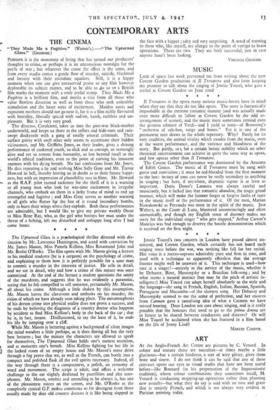MUSIC
LACK of space last week prevented me from writing about the new Covent Garden production of II Trovatore and also from keeping my promise to talk about the singing of Jennie Tourel, who gave a recital at Covent Garden on June 22nd
* * II Trovatore is the opera many serious music-lovers have in mind when they say that they do not like opera. The story is fantastically improbable in the extreme romantic manner (and was actually made even more difficult to follow at Covent Garden by the odd re- arrangement of scenes), and the music must sometimes remind even the greatest admirer of Verdi—and I yield to none—of Browning's " orchestra of salt-box, tongs and bones." Yet it is one of the permanent sure draws in the whole repertory. Why? Partly for its very crudities, the animal vitality which exudes from the music, even at the worst performance, and the violence and bloodiness of the story. But partly, to ), for a certain heroic nobility which no other theatrical entertainment can achieve in quite the same way as opera, and few operas other than 11 Trovatore.
The Covent Garden performance was dominated by the Azucena of Edith Coates. The music of 11 Trovatore must be sung with gusto and conviction ; it must be red-blooded from the first moment to the last : beauty of tone can never be really secondary to anything in singing ; but here, if anywhere, dramatic vigour is at least as important. Doris Doree's Leonora was always careful and musicianly, but it lacked just that romantic abandon, the tragic grand manner, which will make the listener forget or forgive faults of taste in the music itself or the performance of it. Of the men, Marian Nowakowski as Ferrando was most in the spirit of the music. Jess Walters, as the Count di Luna, blustered unconvincingly and often unmusically, and though my English sense of decency makes me sorry for the individual singer " who gets slapped," Arthur Carron's Manrico was bad enough to deserve the hostile demonstration which it received on the first night.
* * * * Jennie Tourel's two concerts in London have passed almost un- noticed, and Covent Garden, which certainly has not heard such singing since before the war, was nothing like full for her recital. Her voice is a mezzo-soprano admirably pure and firm in tone, and used with a technique so apparently effortless that the average listener might well be unaware of it. This technique is used—how rare in a singer!—entirely in the service of the music, whether it be Debussy, Bizet, Mussorgsky or a Brazilian folk-song ; and by what seems a natural instinct (but may be the pitch of artistic in- telligence) Miss Tourel can adapt herself absolutely to the style and the language—she sang in French, English, Italian, Russian, Spanish, Portuguese and Macumba—of the shortest song. Her Debussy and Mussorgsky seemed to me the acme of perfection, and her encores from Carmen gave a tantalising idea of what a Carmen we have missed hearing. Does London not care about singing, and is it really possible that the honours that used to go to the prima donna are in future to be shared between conductors and dancers? Or will Miss Tourel be acclaimed when she has featured in a film based on the life of jenny Lind?
MARTIN COOPER.






































 Previous page
Previous page